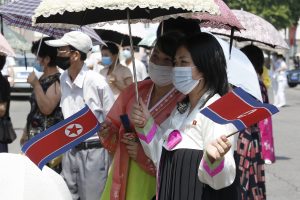While highly unlikely to attain the global success of South Korean pop culture, North Korea continues to find creative ways to soften its negative image abroad through propaganda. This raises concerns of a global disinformation campaign, as North Korean leader Kim Jong Un recently instructed the country’s propagandists to improve overseas messaging efforts, signaling a vested national interest in strengthening the country’s soft power.
North Korea is not ignorant to the financial success and global impact of South Korean pop culture. Often referred to as the Hallyu (한류/韓流) or “Korean Wave” in English, South Korea has profited tremendously from streamlining Korean dramas and pop music to a global audience, a trend that started in the late 1990s during the Asian financial crisis. According to a 2019 study by The Korea Foundation, the overseas market for the South Korean pop culture industry doubled from $5.7 billion in 2015 to $10 billion in 2019, indicating a steady increase in global consumption of South Korean media and drawing a stark comparison to the North Korean economy.
The Bank of Korea estimated North Korea’s GDP at approximately $28.7 billion (32.9 trillion Korean won) in 2019, meaning that the Hallyu’s overseas market alone generated funds equal to around 35 percent of North Korea’s GDP that year. Although this number doesn’t include revenue Pyongyang obtained from illicit sanctions evasion tactics such as cyber-enabled financial crime, it accurately depicts the disparity between the licit economies of North and South Korea. It was only a matter of time until Pyongyang began to craft its own version of Hallyu, but with a North Korean twist” the Choryu (조류/朝流). Whereas the Hal in Hallyu refers to South Korea in the South’s dialect of the Korean language, Cho in Choryu refers to Choson, the name of North Korea in its respective dialect.
For decades, Pyongyang has challenged narratives claiming widespread human rights violations to attract foreign investment and tourism, without much success. United States and United Nations sanctions, coupled with North Korean nuclear weapons tests and the death of American citizen Otto Warmbier, have prevented major shifts in Pyongyang’s negative image in most Western countries. As a result, Pyongyang seeks creative ways to alleviate its financial and political isolation through the leveraging of sympathetic foreign organizations and social media platforms, which offer invaluable access to potential overseas supporters.
Although this kind of access to the outside world is criminalized for average North Koreans, Pyongyang uses state-sponsored media agencies and multilingual members of the elite class to spread propaganda abroad in English, Chinese, Russian, and Korean, through popular social media platforms such as Twitter, Weibo, and YouTube. Despite actions to stymie these efforts, the regime continues to create new social media accounts to entice foreigners to visit the country.
While social media campaigns are far from North Korea’s first stint at overseas propaganda, it demonstrates a significant shift from its traditional approach, which leveraged ethnic nationalism and xenophobia. For example, Pyongyang previously targeted ethnic Koreans abroad by funding North Korean language schools and cultural exchanges for the Chosen Soren, a pro-North Korea organization in Japan. Although currently counting just a fraction of its previous membership in Japan, the Chosen Soren was responsible for facilitating illicit financial transactions on behalf of Pyongyang and acted as a de facto embassy for North Korea.
Chosen Soren members actively defended the North against international criticism for decades until former North Korean leader Kim Jong Il confirmed Tokyo’s accusations of a massive kidnapping scheme targeting Japanese citizens during the late 1970s to 1980s. This revelation shattered the idyllic image of North Korea for many previous Chosen Soren members and current sanctions programs have seemingly prevented a return of high-volume financial transactions involving the Chosen Soren from Japan to North Korea.
In the West, North Korea has relied on the rejection of capitalism to gain support, rather than ethnic nationalism or xenophobia. For example, Alejandro Cao de Benós is a Spanish citizen and the president of the Korean Friendship Association (KFA), a pro-North Korea organization with over 30 official branches in countries including the United Kingdom, Germany, Spain, France, Norway, Italy, the Netherlands, Canada, and the United States.
According to his own accounts, Cao de Benós has brokered business negotiations between Pyongyang and private foreign companies, and also claims to be the only non-Korean person working for the Kim regime. While Pyongyang has yet to confirm his alleged position, it likely welcomes any positive support from abroad as the Freedom House has publicly ranked North Korea as the third-least free country in the world in 2021.
As the North Korean regime continues to launch disinformation campaigns abroad via online platforms, national governments and media outlets which value information integrity must remain vigilant to protect their users by continuing to flag, remove, and block the spread of false information and state-sponsored propaganda.

































